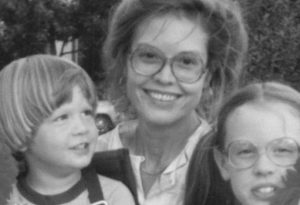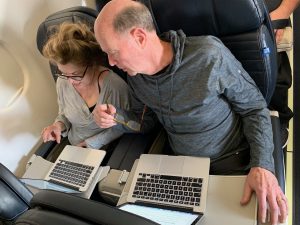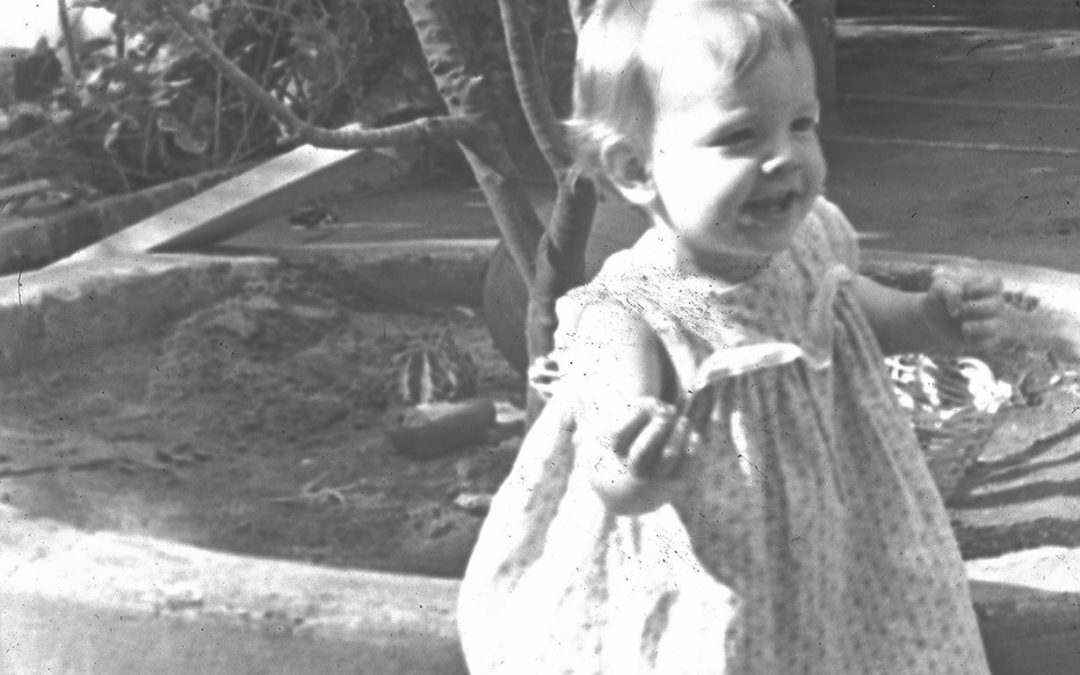Me in Paraguay
I grew up on a leprosy station in Paraguay, South America.
At twenty, I moved to the U.S., married, had two children and supported my husband in getting through school — and then divorced.

Me as a Single Mom
As a single mom, I made my way through an MBA and PhD, and had a highly satisfying career as a consultant and professor of strategic management.
Five years ago, at age sixty-four, I retired and began writing narrative fiction and nonfiction with my husband Ed: books, essays, blogs, newsletters — and we’ve now started a weekly podcast.

Ed and I Working on Writing Projects Even While Traveling
I have had a great life. And this, right now, is the most gratifying chapter of all.
As I look back on my journey, I wonder how I got here. Did I make the choices that led me to this satisfying place? Was it the result of divine intervention? Was it all pre-determined?
It’s the age-old conundrum: Are the patterns of my life the result of forces over which I have no control, or am I able to decide for myself whether to act or behave in a certain way?
The predominant belief in this country long has been that I’m responsible for my choices. The assumption of free will underlies many aspects of American politics, from welfare to criminal laws. It’s what we call the American dream — I can make something of myself, no matter what my origins.
In recent decades, research on the inner workings of the brain has led scientists to question the idea of free will. Brain scans allow us to peer inside our skull and see the networks of neurons, which determine not just some or most, but all of our thoughts, hopes, memories and dreams.
But here’s the thing.
It’s true that some part of my neurological makeup is genetic and out of my control. And it’s true that my actions are the result of how my neurons happen to be firing. But I also know that over time, I can change my neural pathways by trying out new patterns of habits and behaviors. Just because we have formed neural pathways doesn’t mean that we are stuck with those habits forever.
What if it’s both-and rather than either-or?
In fact, the philosopher William James, father of American psychology, coined the terms “soft determinist” and “hard determinist” in an influential essay titled “The Dilemma of Determinism” He argued against hard determinism because it leaves people without hope. Soft determinism allows a role for chance and serendipity in our lives. Replacing hard determinism with a model that includes chance provides hope that we all have a degree of choice in the face of serendipitous circumstances.
I love what my guest on this week’s podcast, Dr. Stephen Post, said about this:
“I don’t plot out my life, but I’m open to responding with creativity to surprises (read: chance or serendipity). My life is a responding life, rather than controlling. We are all more taken on a journey than in control — the divine mind whispers and winks — we just need to listen to the whispers.”
Without a doubt, my life has been a series of divine gifts, for which I am grateful. And sometimes, I’m even sufficiently awake to hear the surprising whispers and to see the unexpected winks.


Following inspiration flowing from Steven Post’s podcast, Marlena is writing about what we call “passionate aging.” I realize I am fortunate to get up mornings excited to engage with her in building our platform of blogs, podcasts, newsletters and books designed to focus our community on who we really are and what’s possible for us.